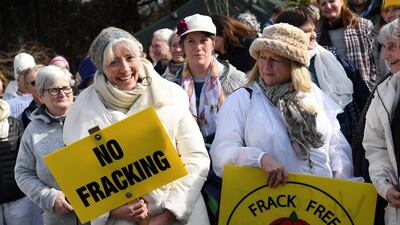At the height of the North Sea oil boom in the 1980s, Britain’s energy industry accounted for 10 per cent of GDP, allowing then Prime Minister Margaret Thatcher to push through the most radical economic transformation since the Industrial Revolution.
Today it is just 2 per cent and Britain, a net exporter of energy as recently as 2003, now imports almost half its needs.
Much of that is in the form of Russian gas, which is not an entirely comfortable position to be in when you are engaged, as Thatcher’s successor Theresa May is, in a tit-for-tat battle with Moscow over the attempted assassination of the former spy Sergei Skripal and his daughter. Imported Russian gas was the single biggest contributor to the country’s chronic trade imbalance last year, and if Russian President Putin were to turn the taps off there would be a real energy crisis. The back-up plan in an emergency was to dip into the glut of cheap LNG, which was available in abundance on the world market up to recently. But that has now been mopped up by the Chinese who have driven LNG prices to three-year highs.
Strategic, political and economic concerns are therefore causing a major rethink of British energy policy, not dis-similar to what the US went through after the last energy shock in 2008. A decade ago the Americans dramatically accelerated their exploitation of its huge shale deposits, which have turned it into the biggest combined producer of oil and gas in the world today.
That programme was highly controversial at the time, with all sorts of scare stories of kitchen taps running with burning gas, poisoned aquifers and collapsing landscape. But we now know, what we didn’t then, that Russian disinformation and fake news was at least partly behind some of the wilder stories stories and fracking is now an accepted and uncontroversial part of American life.
But not yet in Britain, where there is an abundance of shale gas waiting to be exploited. The Bowland Basin in the north of England is said to be five times thicker than the US fracking zones and can supply as much energy as North Sea oil did at its peak. Energy analysts reckon that if just 10 per cent could be extracted, it would cover Britain’s gas requirement for the next 50 years (85 per cent of British homes rely on gas for their heating).
The problem up to now has been the fierce resistance from an uninformed public that is passionately convinced that fracking is the work of the devil and an even more serious threat to mankind than the Soviet nerve gas used on the Skripals. Fracking enthusiasts point out that the process is much less damaging to the environment than LNG or coal, uses less water than the average golf course and is many times preferable to nuclear whose decommissioning costs run into the trillions of pounds.
_______________
Read more:
Can China really become a rival to Brent and WTI?
Burning fossil fuels must be scaled back
_______________
The British government has approached the whole issue with great caution but has allowed just enough activity to let the industry establish a safety record – which it has – and prove the gas is really there in commercial quantities. The energy company Cuadrilla has just drilled rocks near Preston in north-west England which, according to its chief executive Francis Egan, produced “the best results we’ve ever seen – it’s a huge resource”. Mr Egan also points out that the there is an existing gas pipeline just 200 yards away that taps into Britain’s vast network of pipes bringing gas direct into the kitchen of just about every house in the country. He reckons he can produce and deliver gas at prices fully competitive with the Russians.
Growing momentum in the fracking industry is running alongside equally spectacular leaps in the technology of wind-power, where Britain is blessed with some of the best resources in the world. Huge wind farms located in the shallow waters off the Scottish and English coastlines are delivering electricity at prices that no longer need government subsidies. By 2030, according to energy analysts, wind power will be the backbone of Britain’s power system, capable of delivering cheap, efficient and dependable supplies for a century, with gas from the fracking zones not far behind.
Both of these new resources are conveniently located near to the huge industrial wastelands where the world’s first Industrial Revolution began and which may now revive on the back of it, just as America’s fracking industry created a great belt of industrialisation along the US Gulf coast from Texas to Louisiana.
Professor Alan Riley, an energy expert and adviser to the UK government task force on shale gas, reckons that “it is perfectly credible that [Britain] could achieve energy dependence and potentially become a net exporter” by 2025.
The implications of that, post-Brexit, are enormous, not just for Britain's balance of payments and "North-South divide", but for the balance of energy supplies across Europe and even beyond. US crude output is now above 10 million barrels a day for the first time since 1970 with exports rising fast. "The second shale shock," wrote the Financial Times recently, "is set to have an even bigger impact on global oil markets and the geopolitics of energy."
Britain’s resources are not big enough to make much difference to the world equations. But they will make a huge difference to the state of the British economy.
Thirty years ago, North Sea oil provided the revenues and power to turn around the country’s economic fortunes. Fracking and wind-power between them, making nuclear redundant, could be even more significant.

